French Influence in Quebec English Article 2022
VerifiedAdded on 2022/09/25
|6
|1257
|19
AI Summary
.
Contribute Materials
Your contribution can guide someone’s learning journey. Share your
documents today.
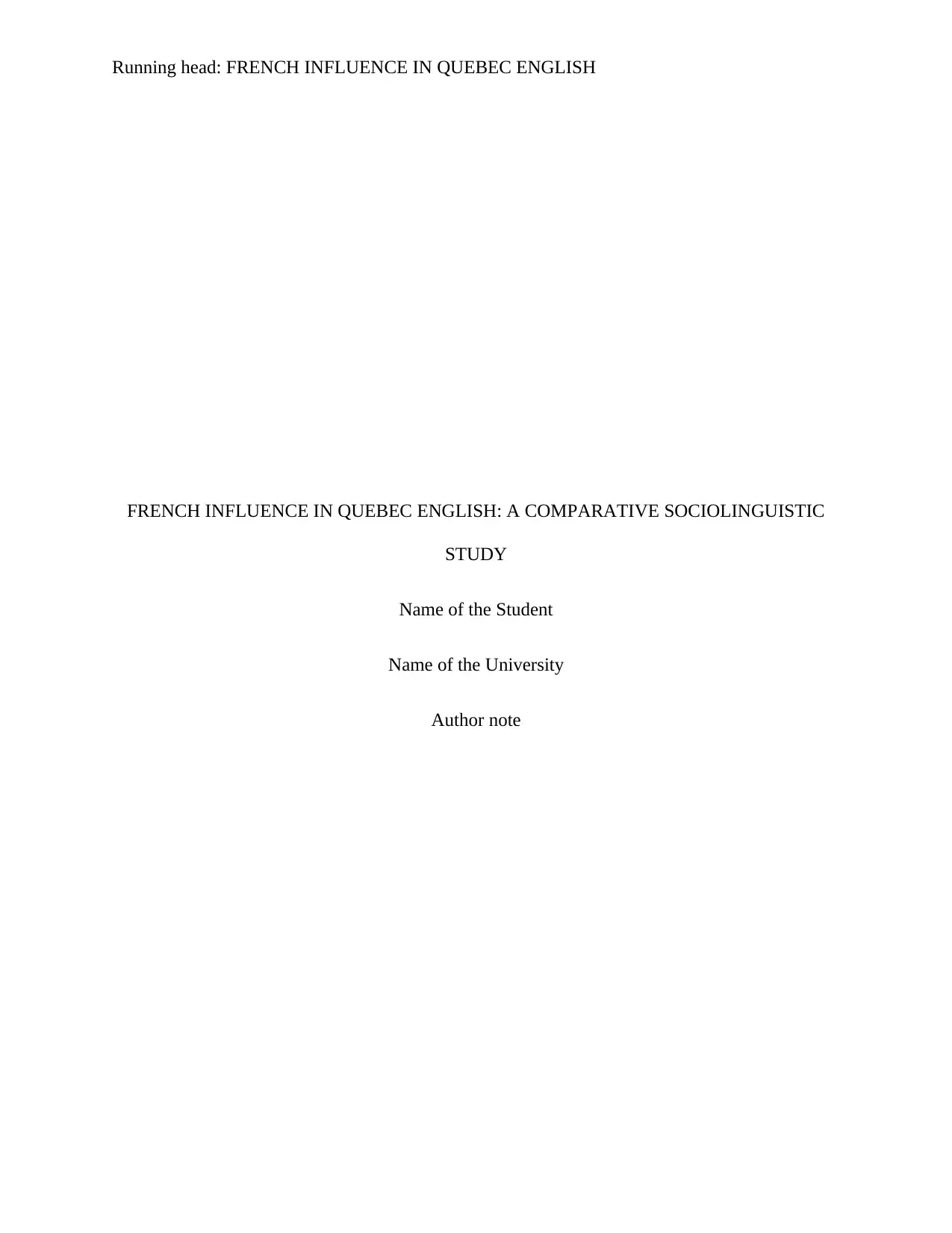
Running head: FRENCH INFLUENCE IN QUEBEC ENGLISH
FRENCH INFLUENCE IN QUEBEC ENGLISH: A COMPARATIVE SOCIOLINGUISTIC
STUDY
Name of the Student
Name of the University
Author note
FRENCH INFLUENCE IN QUEBEC ENGLISH: A COMPARATIVE SOCIOLINGUISTIC
STUDY
Name of the Student
Name of the University
Author note
Secure Best Marks with AI Grader
Need help grading? Try our AI Grader for instant feedback on your assignments.
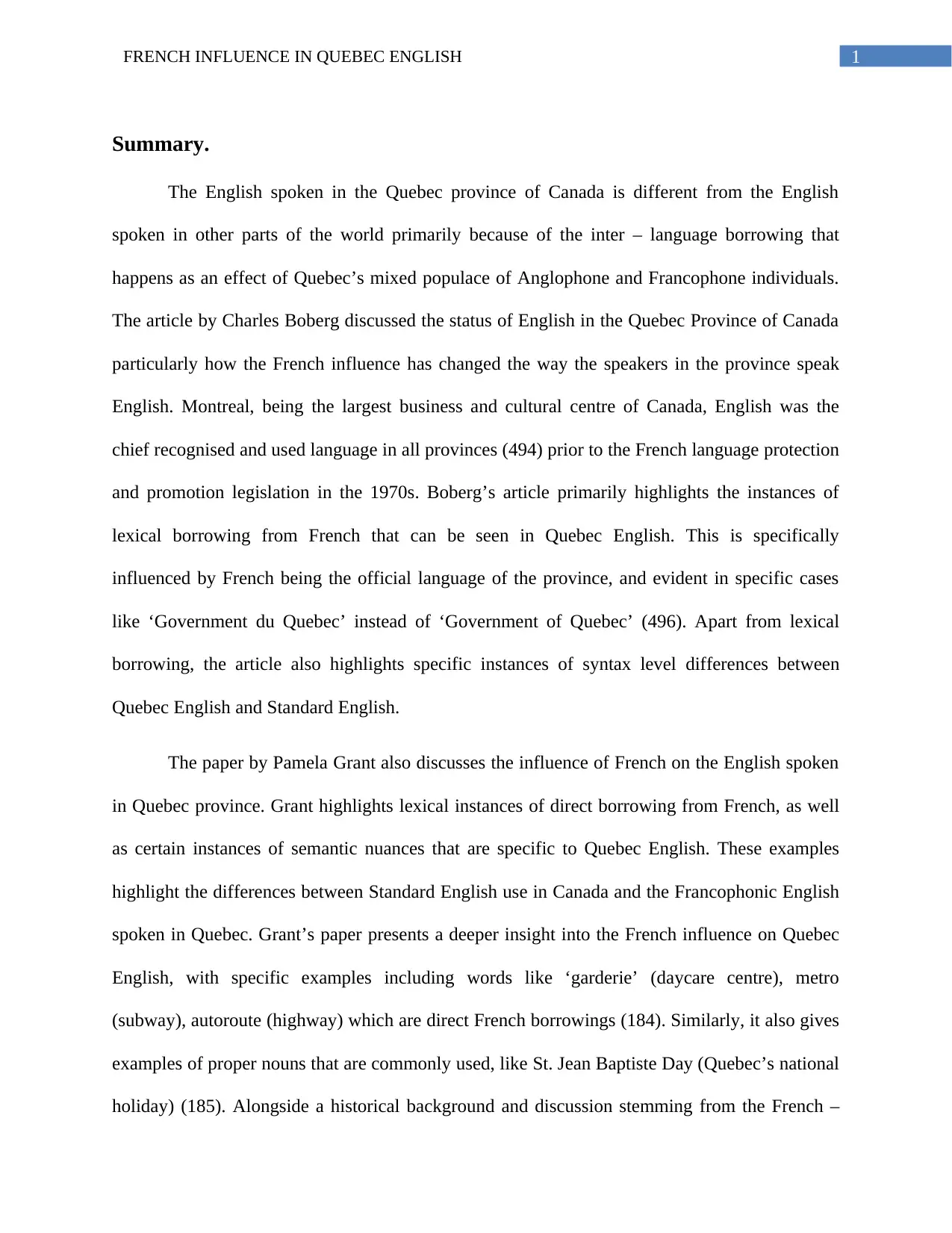
1FRENCH INFLUENCE IN QUEBEC ENGLISH
Summary.
The English spoken in the Quebec province of Canada is different from the English
spoken in other parts of the world primarily because of the inter – language borrowing that
happens as an effect of Quebec’s mixed populace of Anglophone and Francophone individuals.
The article by Charles Boberg discussed the status of English in the Quebec Province of Canada
particularly how the French influence has changed the way the speakers in the province speak
English. Montreal, being the largest business and cultural centre of Canada, English was the
chief recognised and used language in all provinces (494) prior to the French language protection
and promotion legislation in the 1970s. Boberg’s article primarily highlights the instances of
lexical borrowing from French that can be seen in Quebec English. This is specifically
influenced by French being the official language of the province, and evident in specific cases
like ‘Government du Quebec’ instead of ‘Government of Quebec’ (496). Apart from lexical
borrowing, the article also highlights specific instances of syntax level differences between
Quebec English and Standard English.
The paper by Pamela Grant also discusses the influence of French on the English spoken
in Quebec province. Grant highlights lexical instances of direct borrowing from French, as well
as certain instances of semantic nuances that are specific to Quebec English. These examples
highlight the differences between Standard English use in Canada and the Francophonic English
spoken in Quebec. Grant’s paper presents a deeper insight into the French influence on Quebec
English, with specific examples including words like ‘garderie’ (daycare centre), metro
(subway), autoroute (highway) which are direct French borrowings (184). Similarly, it also gives
examples of proper nouns that are commonly used, like St. Jean Baptiste Day (Quebec’s national
holiday) (185). Alongside a historical background and discussion stemming from the French –
Summary.
The English spoken in the Quebec province of Canada is different from the English
spoken in other parts of the world primarily because of the inter – language borrowing that
happens as an effect of Quebec’s mixed populace of Anglophone and Francophone individuals.
The article by Charles Boberg discussed the status of English in the Quebec Province of Canada
particularly how the French influence has changed the way the speakers in the province speak
English. Montreal, being the largest business and cultural centre of Canada, English was the
chief recognised and used language in all provinces (494) prior to the French language protection
and promotion legislation in the 1970s. Boberg’s article primarily highlights the instances of
lexical borrowing from French that can be seen in Quebec English. This is specifically
influenced by French being the official language of the province, and evident in specific cases
like ‘Government du Quebec’ instead of ‘Government of Quebec’ (496). Apart from lexical
borrowing, the article also highlights specific instances of syntax level differences between
Quebec English and Standard English.
The paper by Pamela Grant also discusses the influence of French on the English spoken
in Quebec province. Grant highlights lexical instances of direct borrowing from French, as well
as certain instances of semantic nuances that are specific to Quebec English. These examples
highlight the differences between Standard English use in Canada and the Francophonic English
spoken in Quebec. Grant’s paper presents a deeper insight into the French influence on Quebec
English, with specific examples including words like ‘garderie’ (daycare centre), metro
(subway), autoroute (highway) which are direct French borrowings (184). Similarly, it also gives
examples of proper nouns that are commonly used, like St. Jean Baptiste Day (Quebec’s national
holiday) (185). Alongside a historical background and discussion stemming from the French –
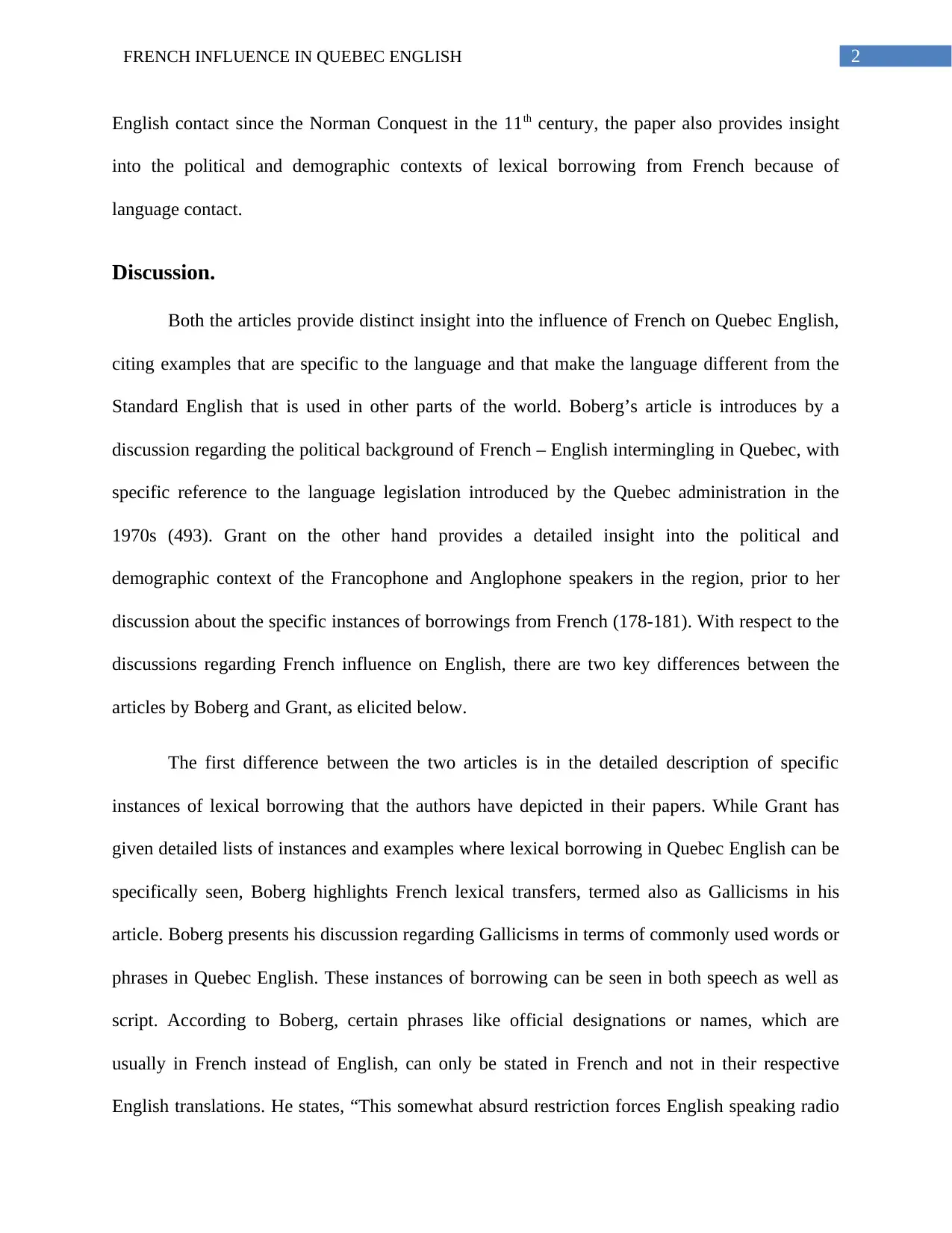
2FRENCH INFLUENCE IN QUEBEC ENGLISH
English contact since the Norman Conquest in the 11th century, the paper also provides insight
into the political and demographic contexts of lexical borrowing from French because of
language contact.
Discussion.
Both the articles provide distinct insight into the influence of French on Quebec English,
citing examples that are specific to the language and that make the language different from the
Standard English that is used in other parts of the world. Boberg’s article is introduces by a
discussion regarding the political background of French – English intermingling in Quebec, with
specific reference to the language legislation introduced by the Quebec administration in the
1970s (493). Grant on the other hand provides a detailed insight into the political and
demographic context of the Francophone and Anglophone speakers in the region, prior to her
discussion about the specific instances of borrowings from French (178-181). With respect to the
discussions regarding French influence on English, there are two key differences between the
articles by Boberg and Grant, as elicited below.
The first difference between the two articles is in the detailed description of specific
instances of lexical borrowing that the authors have depicted in their papers. While Grant has
given detailed lists of instances and examples where lexical borrowing in Quebec English can be
specifically seen, Boberg highlights French lexical transfers, termed also as Gallicisms in his
article. Boberg presents his discussion regarding Gallicisms in terms of commonly used words or
phrases in Quebec English. These instances of borrowing can be seen in both speech as well as
script. According to Boberg, certain phrases like official designations or names, which are
usually in French instead of English, can only be stated in French and not in their respective
English translations. He states, “This somewhat absurd restriction forces English speaking radio
English contact since the Norman Conquest in the 11th century, the paper also provides insight
into the political and demographic contexts of lexical borrowing from French because of
language contact.
Discussion.
Both the articles provide distinct insight into the influence of French on Quebec English,
citing examples that are specific to the language and that make the language different from the
Standard English that is used in other parts of the world. Boberg’s article is introduces by a
discussion regarding the political background of French – English intermingling in Quebec, with
specific reference to the language legislation introduced by the Quebec administration in the
1970s (493). Grant on the other hand provides a detailed insight into the political and
demographic context of the Francophone and Anglophone speakers in the region, prior to her
discussion about the specific instances of borrowings from French (178-181). With respect to the
discussions regarding French influence on English, there are two key differences between the
articles by Boberg and Grant, as elicited below.
The first difference between the two articles is in the detailed description of specific
instances of lexical borrowing that the authors have depicted in their papers. While Grant has
given detailed lists of instances and examples where lexical borrowing in Quebec English can be
specifically seen, Boberg highlights French lexical transfers, termed also as Gallicisms in his
article. Boberg presents his discussion regarding Gallicisms in terms of commonly used words or
phrases in Quebec English. These instances of borrowing can be seen in both speech as well as
script. According to Boberg, certain phrases like official designations or names, which are
usually in French instead of English, can only be stated in French and not in their respective
English translations. He states, “This somewhat absurd restriction forces English speaking radio
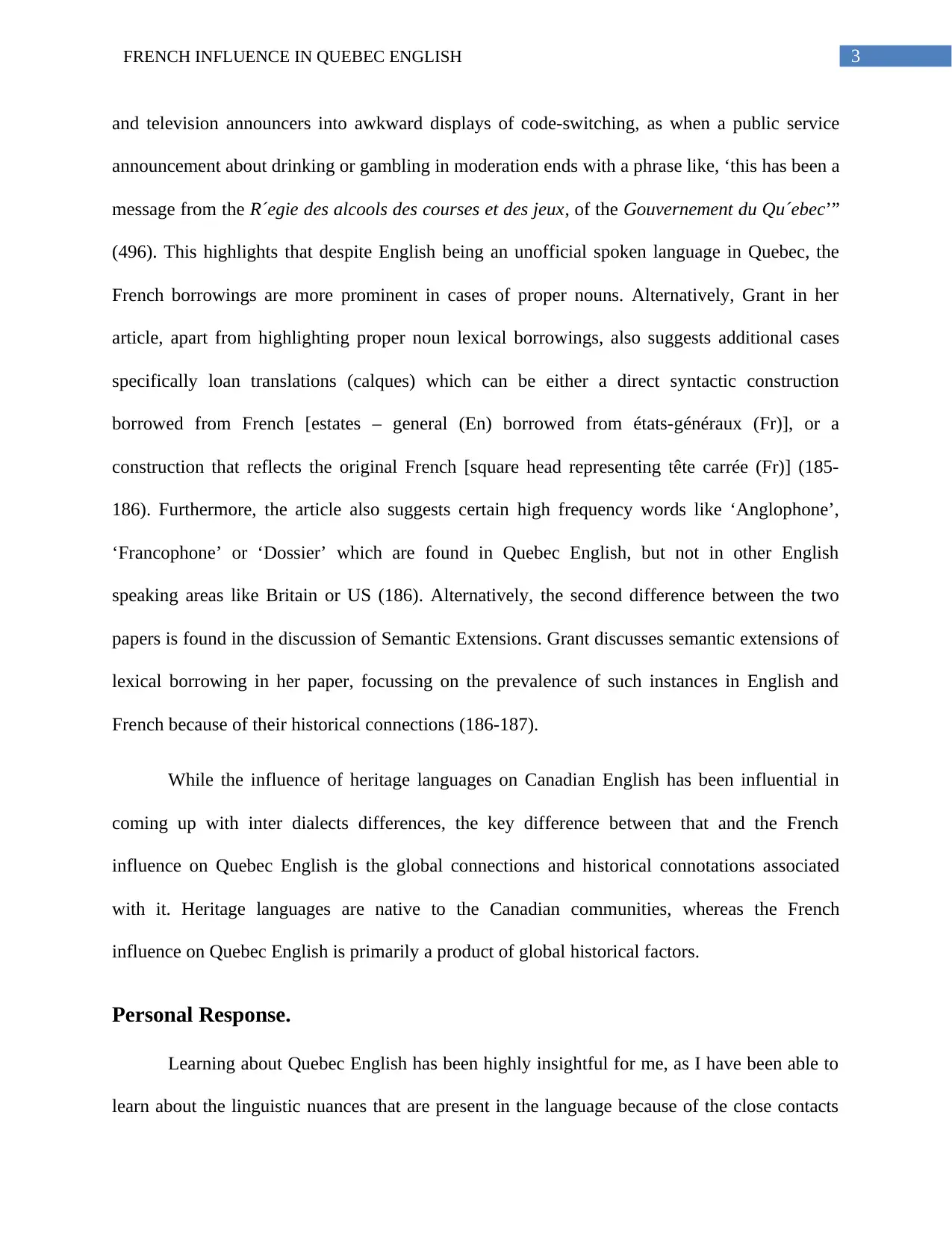
3FRENCH INFLUENCE IN QUEBEC ENGLISH
and television announcers into awkward displays of code-switching, as when a public service
announcement about drinking or gambling in moderation ends with a phrase like, ‘this has been a
message from the R´egie des alcools des courses et des jeux, of the Gouvernement du Qu´ebec’”
(496). This highlights that despite English being an unofficial spoken language in Quebec, the
French borrowings are more prominent in cases of proper nouns. Alternatively, Grant in her
article, apart from highlighting proper noun lexical borrowings, also suggests additional cases
specifically loan translations (calques) which can be either a direct syntactic construction
borrowed from French [estates – general (En) borrowed from états-généraux (Fr)], or a
construction that reflects the original French [square head representing tête carrée (Fr)] (185-
186). Furthermore, the article also suggests certain high frequency words like ‘Anglophone’,
‘Francophone’ or ‘Dossier’ which are found in Quebec English, but not in other English
speaking areas like Britain or US (186). Alternatively, the second difference between the two
papers is found in the discussion of Semantic Extensions. Grant discusses semantic extensions of
lexical borrowing in her paper, focussing on the prevalence of such instances in English and
French because of their historical connections (186-187).
While the influence of heritage languages on Canadian English has been influential in
coming up with inter dialects differences, the key difference between that and the French
influence on Quebec English is the global connections and historical connotations associated
with it. Heritage languages are native to the Canadian communities, whereas the French
influence on Quebec English is primarily a product of global historical factors.
Personal Response.
Learning about Quebec English has been highly insightful for me, as I have been able to
learn about the linguistic nuances that are present in the language because of the close contacts
and television announcers into awkward displays of code-switching, as when a public service
announcement about drinking or gambling in moderation ends with a phrase like, ‘this has been a
message from the R´egie des alcools des courses et des jeux, of the Gouvernement du Qu´ebec’”
(496). This highlights that despite English being an unofficial spoken language in Quebec, the
French borrowings are more prominent in cases of proper nouns. Alternatively, Grant in her
article, apart from highlighting proper noun lexical borrowings, also suggests additional cases
specifically loan translations (calques) which can be either a direct syntactic construction
borrowed from French [estates – general (En) borrowed from états-généraux (Fr)], or a
construction that reflects the original French [square head representing tête carrée (Fr)] (185-
186). Furthermore, the article also suggests certain high frequency words like ‘Anglophone’,
‘Francophone’ or ‘Dossier’ which are found in Quebec English, but not in other English
speaking areas like Britain or US (186). Alternatively, the second difference between the two
papers is found in the discussion of Semantic Extensions. Grant discusses semantic extensions of
lexical borrowing in her paper, focussing on the prevalence of such instances in English and
French because of their historical connections (186-187).
While the influence of heritage languages on Canadian English has been influential in
coming up with inter dialects differences, the key difference between that and the French
influence on Quebec English is the global connections and historical connotations associated
with it. Heritage languages are native to the Canadian communities, whereas the French
influence on Quebec English is primarily a product of global historical factors.
Personal Response.
Learning about Quebec English has been highly insightful for me, as I have been able to
learn about the linguistic nuances that are present in the language because of the close contacts
Secure Best Marks with AI Grader
Need help grading? Try our AI Grader for instant feedback on your assignments.
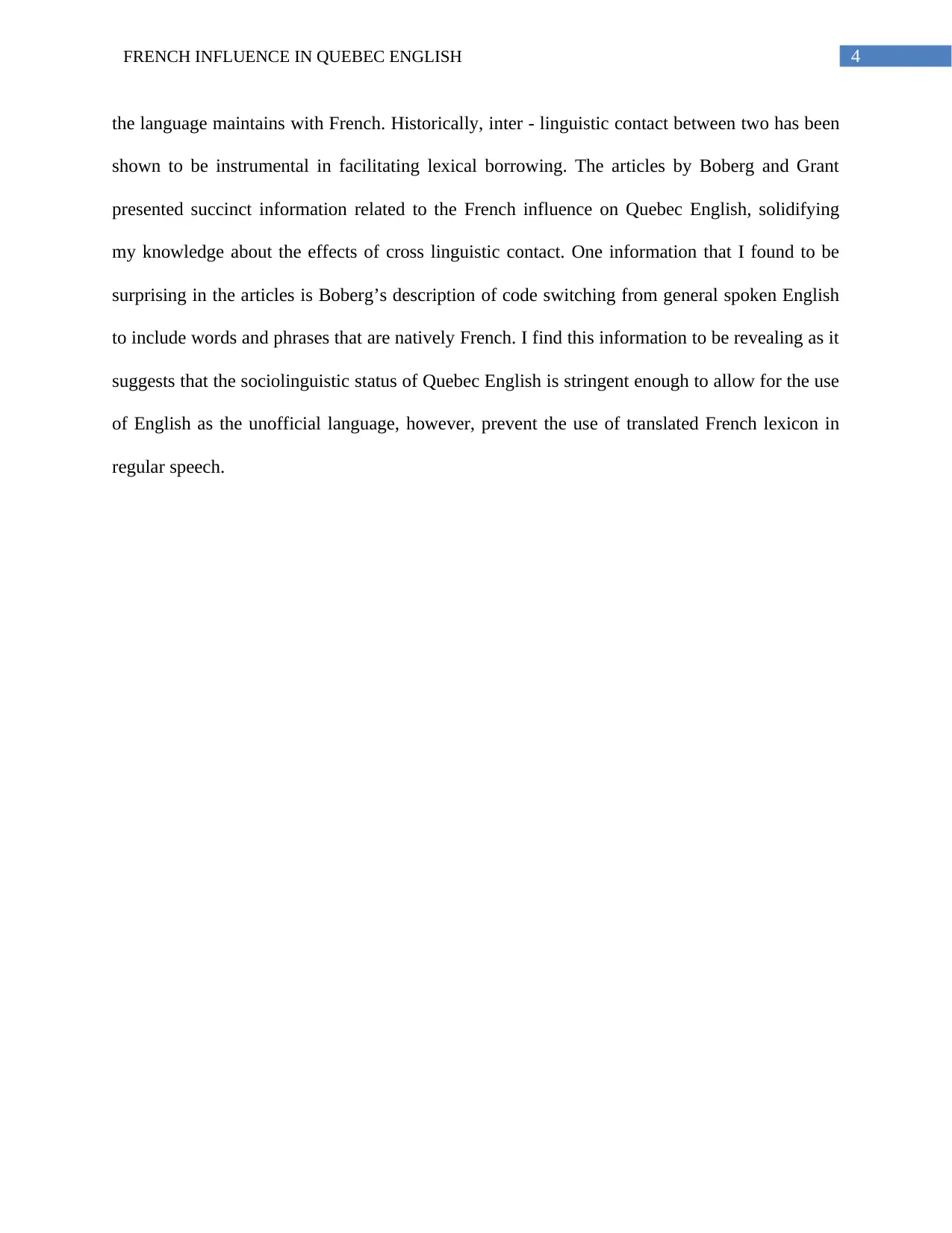
4FRENCH INFLUENCE IN QUEBEC ENGLISH
the language maintains with French. Historically, inter - linguistic contact between two has been
shown to be instrumental in facilitating lexical borrowing. The articles by Boberg and Grant
presented succinct information related to the French influence on Quebec English, solidifying
my knowledge about the effects of cross linguistic contact. One information that I found to be
surprising in the articles is Boberg’s description of code switching from general spoken English
to include words and phrases that are natively French. I find this information to be revealing as it
suggests that the sociolinguistic status of Quebec English is stringent enough to allow for the use
of English as the unofficial language, however, prevent the use of translated French lexicon in
regular speech.
the language maintains with French. Historically, inter - linguistic contact between two has been
shown to be instrumental in facilitating lexical borrowing. The articles by Boberg and Grant
presented succinct information related to the French influence on Quebec English, solidifying
my knowledge about the effects of cross linguistic contact. One information that I found to be
surprising in the articles is Boberg’s description of code switching from general spoken English
to include words and phrases that are natively French. I find this information to be revealing as it
suggests that the sociolinguistic status of Quebec English is stringent enough to allow for the use
of English as the unofficial language, however, prevent the use of translated French lexicon in
regular speech.
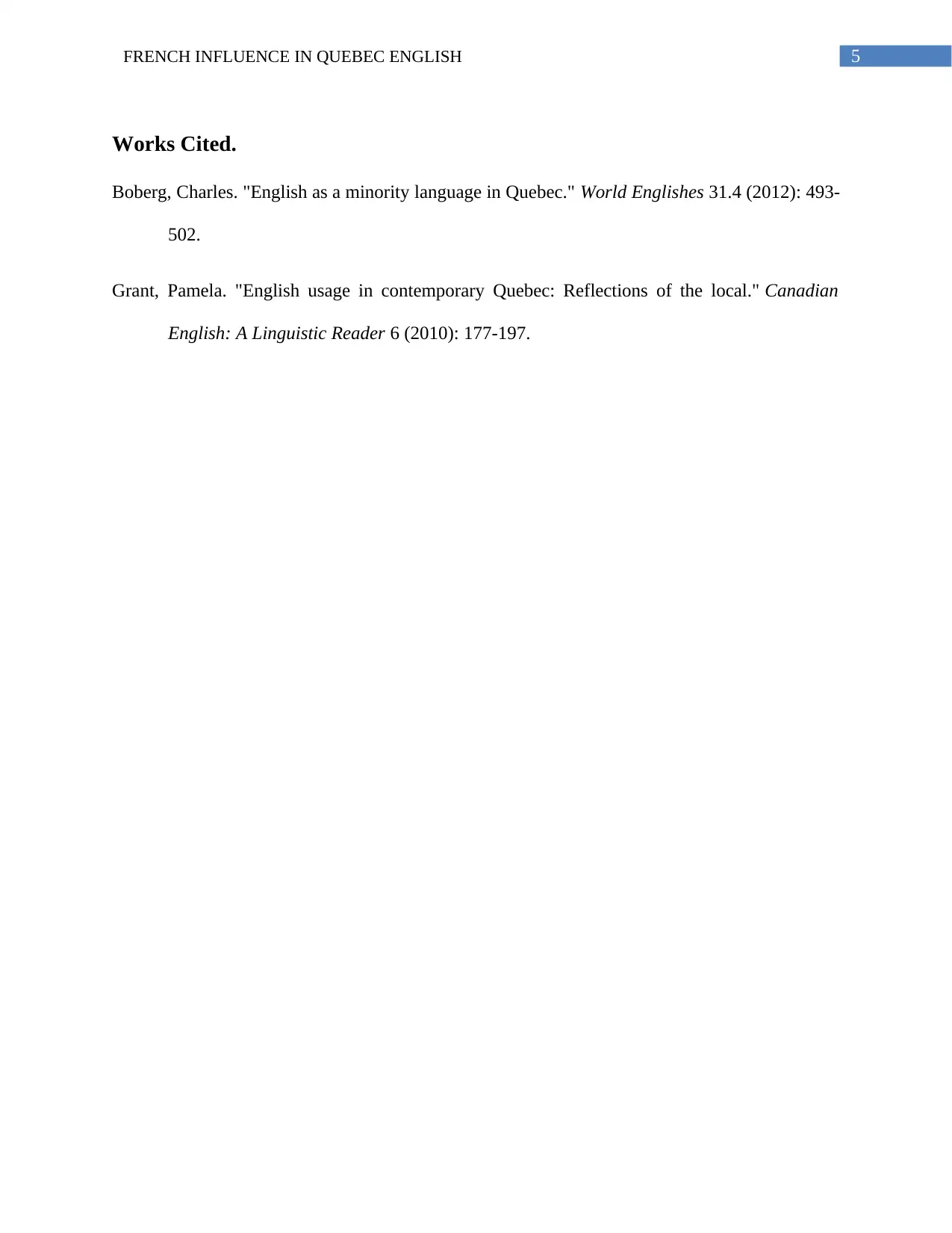
5FRENCH INFLUENCE IN QUEBEC ENGLISH
Works Cited.
Boberg, Charles. "English as a minority language in Quebec." World Englishes 31.4 (2012): 493-
502.
Grant, Pamela. "English usage in contemporary Quebec: Reflections of the local." Canadian
English: A Linguistic Reader 6 (2010): 177-197.
Works Cited.
Boberg, Charles. "English as a minority language in Quebec." World Englishes 31.4 (2012): 493-
502.
Grant, Pamela. "English usage in contemporary Quebec: Reflections of the local." Canadian
English: A Linguistic Reader 6 (2010): 177-197.
1 out of 6
Related Documents
Your All-in-One AI-Powered Toolkit for Academic Success.
+13062052269
info@desklib.com
Available 24*7 on WhatsApp / Email
![[object Object]](/_next/static/media/star-bottom.7253800d.svg)
Unlock your academic potential
© 2024 | Zucol Services PVT LTD | All rights reserved.





